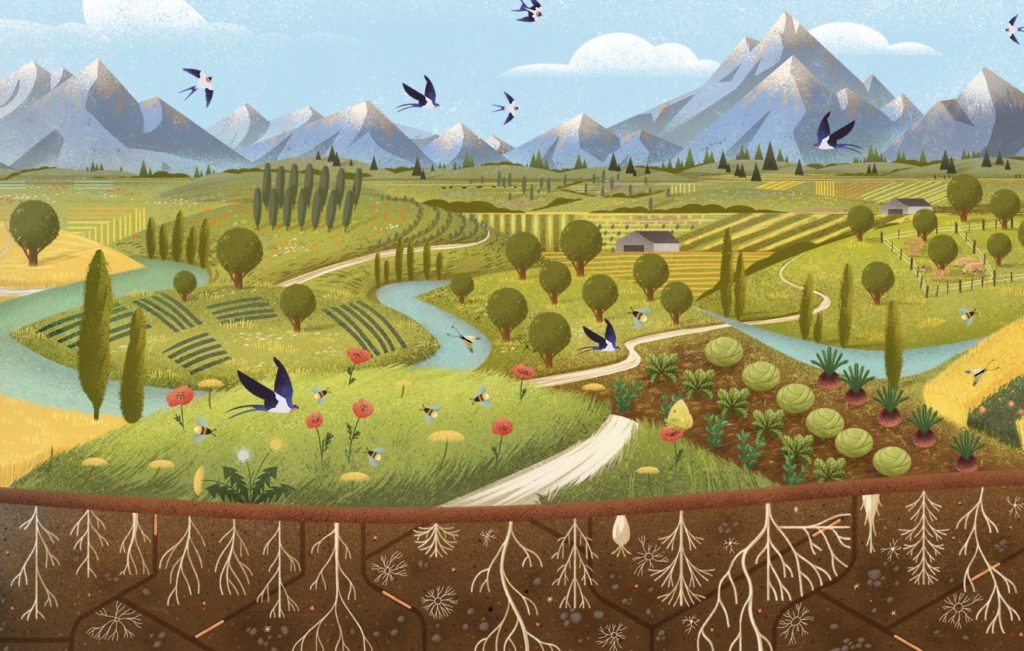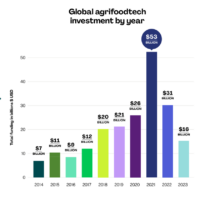
Source: Ellen Macarthur Foundation
Every week we track the business, tech and investment trends in CPG, retail, restaurants, agriculture, cooking and health, so you don’t have to. Here are some of this week’s top headlines.
The alternative protein space continued to heat up with this week’s headlines. Impossible Foods is set to launch its plant-based pork product in the US, Hong Kong and Singapore restaurants this Thursday. Cultured meat firms Mosa Meat and Aleph Farms received funding from environmental activist Leonardo DiCaprio. Dutch scientists have made cell-based caviar a reality.
Last but not least, the Ellen Macarthur Foundation has released a study explaining how food brands and supermarkets can make nature-positive food in a circular economy the norm.
Our newsletter takes a lot of time and resources to produce. Make a one time or monthly contribution to help us keep it going. Whether it’s $5 or $500, every bit helps and shows us that you value our work.
Check out our weekly round-up of last week’s top food startup, tech and innovation news below or peruse the full newsletter here.
1. Impossible Foods to Launch Meatless Pork in US, Hong Kong and Singapore – CNBC
The ground pork product will first be available in restaurants in the US, Hong Kong and Singapore, with further plans for retail expansion in those markets in the coming months.
2. The Big Food Redesign – Ellen Macarthur Foundation
Food brands and supermarkets have the power to make nature-positive food the norm. The Foundation’s latest study, The big food redesign: Regenerating nature with the circular economy, explains how.
3. Ripple Foods Catches a $60M Funding Wave for New Dairy-Free Products, Global Expansion – Green Queen
Funding will allow Ripple to increase its offerings—vegan cheese and soft serve are in the works—as well as speed expansion plans. It’s currently sold in the US and Canada, but plans are to take it global.
4. Leonardo DiCaprio Invests in Cultivated Meat Firms Mosa Meat and Aleph Farms – Food Navigator
The scale of DiCaprio’s investment was not disclosed. The actor will also serve as an advisor to both companies.
5. Imperfect Foods’ CEO Is Out As the Company Sheds Half Its C-Suite and Faces Rounds of Layoffs – Business Insider
Imperfect Foods’ grocery sales skyrocketed during the pandemic. Now CEO Philip Behn has left as the company lays employees off.
6. Netherlands: Dutch Scientists Are Making Cell-Based Caviar A Reality – Green Queen
Researchers are developing what they will call Magiccaviar, a cell-cultured fish roe product made from in vitro grown oocytes.
7. Sunday Raises $100M for Its Fast Restaurant Checkout Flow – TechCrunch
The startup has developed a checkout system for physical restaurants using QR codes.
8. Robot-Powered Indoor Farming Startup Iron Ox Raises $53M, Gears Up to Open 535K-Sq-Ft Facility in Texas Later This Year – Food Navigator
The company worked on drone delivery at Google before exploring robot-powered greenhouses. Its new facility will become operational later this year.
9. Israel: Autonomous Farming Startup Blue White Robotics Raises $37M Series B Funding – AFN
Blue White Robotics’ platform combines robotic tractors with management software so that one human can control a fleet of autonomous vehicles to fulfill a number of different farming tasks.
10. HumanCo Gets $35M and Buys Gluten-Free Pizza Maker Against the Grain – Food Dive
The better-for-you holding company’s latest funding round is full of notable investors ranging from Indra Nooyi to Cindy Crawford.
11. UK: London’s Jiffy Scoops $28M for Speedy Grocery Delivery – TechCrunch
The grocery delivery startup operates a network of its own dark stores to do fulfillment, enabling it to offer groceries in 15 minutes. It currently has eight London stores–now with the funds to expand.
12. ‘Crowdfarming’ Platform Steward Raises $8.8M in Series A Round – AFN
The startup partners with sustainable farming enterprises and other food producers to help them access working capital for their businesses.
13. How Aqua Cultured Foods Plans to Own the Whole Cut Seafood Analog Space – Food Dive
The startup uses a combination of fermentation techniques to make products that have a look, texture and nutritional profile similar to those from animals.
14. White Striping Disease Hits 99% of US Supermarket Chicken – Bloomberg
The illness is driven by the extreme conditions of factory farming. Chickens with white striping have fat content that is 224% higher than those without the affliction, decreasing the meat’s protein content by 9%.
15. New York Passes Sweeping Bills to Improve Conditions for Delivery Workers – New York Times
A package of legislation from the City Council set minimum pay and working conditions, placing New York at the forefront of regulating a multibillion-dollar industry.
16. Asia’s Food Spending Is Set to Double to More Than $8T by 2030 – CNBC
Food spending in the region will hit more than $8 trillion by the start of the next decade–up from $4t in 2019–becoming the world’s largest food and beverage market.
Our newsletter is the absolute easiest way to stay on top of the emerging sector, so sign up for it today and never miss the latest food tech and innovation news and trends, Already signed up? Share the love with your friends and colleagues!





